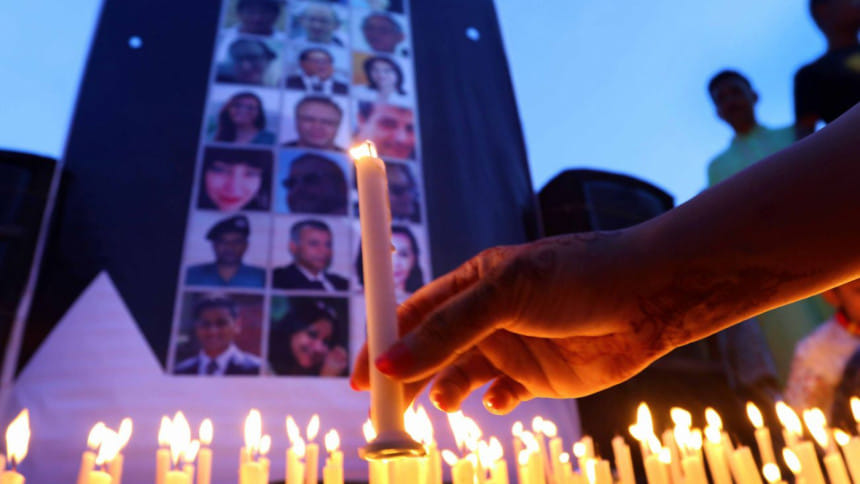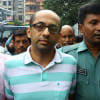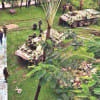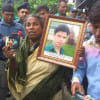An attack to cripple Bangladesh

The terror attack on July 1, 2016 hurt Bangladesh in a way no other incident has—it left us bare and wounded, stripping away our confidence, our image as a peaceful, hospitable nation in the eyes of the world. It crushed and devastated the families and friends of those unfortunate souls who had to face the most horrible, agonising moments of terror before their lives were brutally cut short. Those left behind are still struggling to cope with the excruciating pain through commemorations and noble endeavours to keep the names of their loved ones alive.
While Dhaka has almost bounced back from the devastation as is characteristic of this resilient city, we must not forget what happened on July 1, no matter how traumatic the recollection maybe; we must not forget what it did to our nation and national psyche. It is important to remember this day so that we do not slip into that false sense of complacency that resulted in such a petrifying mass killing carried out by a group of young men with unexpected profiles.
Yes, there have been many other terror attacks. A bomb blast in Ramna Batamul in 2001 that killed 10 people and injured many, a deadly grenade attack on August 21, 2004 on an Awami League rally that left 24 dead and 300 wounded, the systematic slaying of bloggers, publishers and progressive-minded teachers, to name a few. There were also bomb blasts in Sholakia, Kishoreganj, only days after the July 1 attack, on an Eid congregation that killed two constables and a woman. All these attacks pointed to the fact that there were religious fanatics who had turned to terror to get their point across. Militant outfits were identified and some successfully subdued. But the Holey Artisan Bakery attack in 2016 had another diabolical dimension—the targets were mainly foreigners. It was a sequel to the murder of an Italian national and Japanese development worker in 2015.
The brutality with which the 17 foreigners, along with Bangladeshis perceived as enemies of the attackers, were killed was unprecedented. The attackers made it clear that only non-Muslims or those not conforming to their version of religion were being "punished". Hence even a pregnant woman was not spared.
Neither was Ishrat Akhond, a bright young Bangladeshi professional, known for her effusive personality and support of Bangladeshi artists, who apparently defied her attackers—or Abinta Kabir, a Bangladeshi studying at Emory University, Oxford College, Atlanta, whose dream was to come back to her country and help underprivileged children; she had an American passport and hence was identified as an 'enemy'. And then there was Faraaz, a practicing Muslim Bangladeshi whose "crime" in the eyes of the attackers was that he refused to leave his two young friends Abinta and Tarishi, an Indian national, even when he was given the option to leave with the other hostages being freed by the terrorists.
That is a story in itself. This 20-year-old, happy-go-lucky boy seemed to have changed the narrative of this otherwise grisly tale. While Bangladesh and the world were united in their disgust at the mayhem and ruthlessness displayed by yet another group of "Islamist terrorists", Faraaz, a devoted Muslim who could definitely recite verses from the Quran if he had been asked to, who prayed and fasted and had done Umrah several times with his parents, a patriotic Bangladeshi—this lanky young man stood up to what must have been the most fearsome attackers who claimed to be on this slaughtering rampage for the sake of religion.
What Faraaz displayed was that being a Muslim also meant being compassionate, loyal, protective of innocents. This was the side of Islam that the world had stopped seeing, that those terrorists and their ilk had been so successful in suppressing. His act of sacrifice in the name of friendship and justice has earned him unbelievable recognition all over the world. He has posthumously received the Mother Teresa Award that honours individuals and organisations that promote peace, equality and social justice. The Faraaz Hossain Courage Award from 2016 has been launched, to be awarded each year for twenty years to recognise acts of exceptional courage by individuals setting examples of empathy for fellow human beings, to encourage the spirit of bravery among Bangladeshi youth. In July 2016, the Italian Embassy in Tunis planted a tree to honour Faraaz in the Garden of the Righteous Worldwide, dedicated to righteous Arab and non-Arab Muslim individuals who saved human lives during genocides or massacres and fought against fanaticism. His alma mater Emory University in Atlanta has introduced the Faraaz Hossain Core Values award to recognise him as a symbol of bravery, friendship and humanity. These are only some of the examples of how Faraaz's act of sacrifice and display of humanity has moved people all over the world.
One cannot help but wonder whether this has dissuaded any of those other young men brainwashed and manipulated to carry out despicable murders of fellow human beings on the twisted pretext of protecting their religion. Would some of them who still have even a hint of empathy in them wonder whether an ideology that allowed for the killing of an unarmed fellow Muslim could really be one that could be endorsed under the name of religion? Would this version of Islam that evoked compassion for fellow beings regardless of their faith, that stood up to injustice, move them enough to change their self-destructive course that could only bring more misery to the world, not less?
Only time will tell.
Meanwhile, it is important for us to look at the July 1 attack as separate from other terrorist attacks. The fact that the terrorists targeted mainly foreigners by releasing almost all the Bangladeshis (and Muslims) indicates that the aim was to create widespread panic among the expat community. We only have to remember the aftershocks of this attack: the largescale exodus of foreigners living in Bangladesh, the empty restaurants and hotels once regularly frequented by an expat clientele, the cheerless campuses of international schools devoid of international students, the loss of business in the RMG sector, the battle-zone look of Gulshan that remained eerie, gloomy and bleak for months on end. Apart from the crores of dollars lost in business, Bangladesh faced the humiliation of having its name associated with religious terror, and even worse, as a country dangerous for foreigners and non-Muslims. Thus, the ulterior motive of this heinous attack may not have been the spread of a purely twisted, ISIS-influenced ideology, as suggested by the attackers (through social media posts and videos), but something more politically complex: the goal seemed to be to bring Bangladesh to its knees, economically and psychologically.
And even though the attackers picked their victims randomly, the lives lost are a loss for us all. Among the victims were Japanese nationals involved in development work in Bangladesh, Italians who worked at buying houses, Bangladeshi students studying abroad who had dreams of coming back to their motherland and contributing to its progress. Two police officers were also killed. All these people who had such important connections to this country, were lost to this mindless act of terror.
Thankfully, for a large part, Dhaka has been able to lift its head from the dark waters; the expat scene is slowly embracing normalcy, though not without caution. The series of raids of militant dens by government forces have been to a large extent successful in apprehending or killing some of the leaders of these terrorists and in containing militancy. There are, however, many questions that keep haunting the public mind regarding the Holey Artisan Bakery attack. The attackers of July 1 turned out to be young men from fairly well-off backgrounds; some had gone to well-known English medium schools and even private universities here and abroad. They had obviously been radicalised by powerful mentors, not all of whom have been caught. How many others were similarly radicalised and where are they now? There is no information on what happened to all those missing young men (and women) who were suspected to have joined ISIS in Syria. Are they back, are they still part of the death cult that is based on the killing of fellow human beings? What about the two Holey Artisan employees who died under unexplained circumstances? What did our law enforcers and intelligence agencies learn from the suspects they caught? How successful has the government been in its de-radicalisation campaign? Why the indulgence of religious zealots who continue to spew hate and bigotry?
These are uncomfortable questions for our tight-lipped authorities but they must be addressed with candour if we are to regain our sense of security and restore the confidence of the expat community. Keeping the facts in a shroud of mystery will only create a vacuum, and as we know such a vacuum, where facts are kept so blurry, almost always attracts the most unsavoury of forces.
Aasha Mehreen Amin is Deputy Editor, Editorial and Opinion, The Daily Star.

 For all latest news, follow The Daily Star's Google News channel.
For all latest news, follow The Daily Star's Google News channel. 







Comments